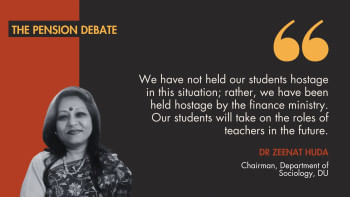Are students sympathetic to the teachers' protest?

Returning to the classroom after nearly 18 months in 2021 due to the Covid pandemic was a daunting prospect. The thought of lost time weighed heavily on my mind. Session jams are a common issue at public universities, as everyone says, and seeing my peers at private universities make up for the lost time only added to my worries. The ongoing strike of teachers at 35 public universities demanding exclusion from the contentious Prottoy pension scheme adds to the worries of the students.
The finance ministry announced a pension scheme titled "Prottoy" on March 13 this year. Since then, many peaceful protests have been staged, including the distribution of memoranda, sit-in programmes, human chains, issuance of statements, and gathering signatures from the public. However, a full-scale strike started on July 1. Teachers at public universities across the nation, including Dhaka University (DU), have been abstaining from holding classes and exams in protest against the government's decision to force them to enrol in the Prottoy pension system.
As the teachers push for their demands, it is the students who face the harshest consequences. University classes and departmental offices remain closed, putting their education on hold. The suspension of official activity in the DU administrative building causes disruptions in critical academic support services. The closing of Dhaka University's Central Library deprives students and job seekers of critical study tools. This extended disruption not only postpones the students' schooling and future ambitions, but it also increases stress and worry about their academic and professional prospects.
The ongoing strike has caused tremendous frustration among students, making them increasingly unsympathetic to the teachers' protests, because with classes and departmental offices closed, students are experiencing a significant academic disruption. As students bear the brunt of these effects, their initial understanding of the teachers' demands is being gradually obscured by their immediate struggles, resulting in a growing lack of solidarity.
Another reason behind the growing lack of sympathy is the teachers' poor communication with the students about the situation. Without a clear explanation of the reasons behind the strike and its goals, students feel blindsided by the sudden disruption. This lack of transparency makes students feel that the strike has been imposed on them without considering their future, further eroding their sympathy for the teachers' cause. Students, including myself, have been informed about the situation primarily through the media. There has been no direct communication from the respective departments to update students on the current circumstances.
Protests are a big part of our student identity. However, teachers rarely show solidarity with students' protests, regardless of their cause or goal. This recurrent lack of support from teachers during student demonstrations undermines students' sympathy for teachers' own protests, such as the current strike demanding exclusion from the universal pension scheme. The observed disparity in cooperation between students and teachers indicates a lack of solidarity in the educational environment.
There are various critical concerns at public universities that require joint efforts from students and teachers, for instance hall seat allotment, quota reformation, etc. Students' issues frequently overlap with those of teachers, showing a shared stake in overcoming institutional shortcomings. However, the prevalent culture frequently encourages a sense of detachment, in which student difficulties are considered only as related to students while teachers' concerns are viewed solely as their own. Genuine empathy and mutual support require both parties to recognise and comprehend each other's contexts and concerns. To solve structural difficulties, we need to transition to a more inclusive conversation and cooperative approach. Public universities can better align their efforts to improve educational settings and promote the welfare of all stakeholders by cultivating a culture of shared responsibility, open communication, and solidarity.
Azra Humayra is majoring in mass communication and journalism at the University of Dhaka. She can be reached at [email protected].
Views expressed in this article are the author's own.
Follow The Daily Star Opinion on Facebook for the latest opinions, commentaries and analyses by experts and professionals. To contribute your article or letter to The Daily Star Opinion, see our guidelines for submission.

 For all latest news, follow The Daily Star's Google News channel.
For all latest news, follow The Daily Star's Google News channel. 










Comments